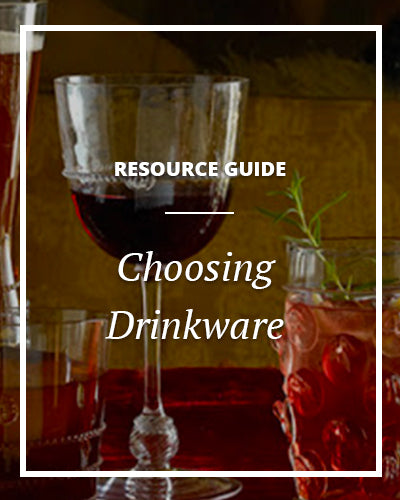Your Cart is Empty
Complimentary Shipping on Orders over $150 (some exclusions apply)
Complimentary Shipping on Orders over $150 (some exclusions apply)

We think of drinkware as jewelry for the table. It can be simple and elegant or it can be drama and bling. It should express your style as well as set the mood for your dinner or soriee. Below we've put together the most frequently asked questions we get in our shop helping customers choose drinkware.

What are the kinds of drinkware available?
You need drinkware for beverages, water, and wine. Barware is an added plus if you entertain with cocktails and beer.
Stemware. Stemware is used for wine, champagne and water. The size and shape of the bowl (the part of the stemware above the stem) determine its functionality. As an example, a water glass usually has the largest bowl size, with wine being smaller (or you could use the water glass for a hefty pour of wine). Champagne is usually served in a flute and would not be served in a water glass.
Barware. Highballs, rocks glasses, shot glasses, pilsners and martini glasses are all glasses used on the drink cart and are designed specific to a type of drink. Their need and use is determined by how you entertain.
Do I want glass or crystal?
The type of material for drinkware is purely dependent on personal preference. Some people prefer crystal for formal and holiday functions and prefer glass or crystallin for everyday use. Or, some people prefer glass for both formal and informal entertaining.
Glass. Glass is a classic option for drinkware and offers the most versatility in style and a lower price point. Most glass drinkware is dishwasher safe. (example, Casafina Glassware)
Crystal. Classic crystal, also known as Lead Glass, is glass that is traditionally made with potash (salts) and lead and is known for looking much better than traditional glass. We recommend hand washing crystal. (example, Baccarat)
Crystallin. Also known as “Cystal Glass, is the lead free variety of crystal. Barium, potassium, and zinc are used instead of lead. Like crystal, crystallin’s appearance is favored over glass. (example, Simon Pearce Glassware). Most crystallin is dishwasher safe, however we recommend hand washing large pieces.
What kind of stemware do I need?
We get this question on a daily basis. The answer is it really depends on how you dine and entertain. We recommend at a minimum a water glass and a overall wine glass per place setting. If you enjoy more wines and their nuances then we suggest wine glasses based on their shape to bring out the best in a specific wine.
Red wine. The bowl shape of wine glasses usually determines its use. A wider bowl increases the surface area of the wine that's exposed to air and encourages alcohol evaporation, which allows the wine to oxidize and create the wine's aroma. Because so much of what you taste is informed by what you smell, the aroma of a wine can alter it's taste. To promote oxidation and improve the noise (aroma) red wine glasses usually have wider bowls.
White wine. White wines, which are lighter than red wines, are best enjoyed with only slight oxidation. Too much oxidation can begin to mask the nuances of the varietals. A narrower, taller bowl reduces surface area, thereby preserving the delicate bouquet of white wines. Champagnes also benefit from this shape, as they lose their carbonation when exposed to oxygen.
What kind of barware do I need?
Options include beer mugs, rocks glasses (or double old fashion glasses), martini glasses, shot glasses, and brandy snifters. For cocktail parties, you may also need pitchers, carafes and decanters for serving drinks.
How do I care for my drinkware?
Most everyday drinkware is dishwasher safe. We recommend the low heat setting with a non-acidic, non-citrus soap. If you've ever wondered why your glassware is getting cloudy, that is the dishwasher etching the glass. High heat, with citrus or acidic soap creates and etching environment for glass. And once the glass is etched and cloudy, it cannot be removed. Fine stemware should be washed by hand and dried with a lint-free cloth. We do not recommend using the dishwasher for any crystal stemware. Never use steel wool or abrasives on your stemware.